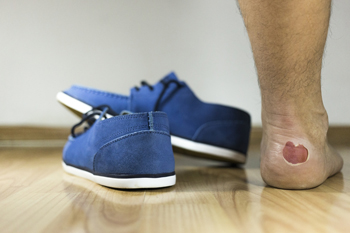 If you notice an area of skin on your child’s foot in the shape of what appears to be a small bubble, you are most likely looking at a blister. They are typically caused by excess friction that is placed on that portion of the skin, and this generally originates from wearing shoes or socks that are too tight. There may be additional reasons why blisters might occur, which may include allergic reactions, extreme burns, or insect bites. The body creates a natural defense mechanism to protect the affected area, and it’s important to tell your child to refrain from touching or popping the blister. If it should burst as a result of pressure that is applied to it, it is beneficial to wash the area with clean water, and this may possibly promote healing. If pain is caused by a blister that forms on your child’s foot, it is suggested that you seek the counsel of a podiatrist who can properly treat this condition.
If you notice an area of skin on your child’s foot in the shape of what appears to be a small bubble, you are most likely looking at a blister. They are typically caused by excess friction that is placed on that portion of the skin, and this generally originates from wearing shoes or socks that are too tight. There may be additional reasons why blisters might occur, which may include allergic reactions, extreme burns, or insect bites. The body creates a natural defense mechanism to protect the affected area, and it’s important to tell your child to refrain from touching or popping the blister. If it should burst as a result of pressure that is applied to it, it is beneficial to wash the area with clean water, and this may possibly promote healing. If pain is caused by a blister that forms on your child’s foot, it is suggested that you seek the counsel of a podiatrist who can properly treat this condition.
Blisters are prone to making everyday activities extremely uncomfortable. If your feet are hurting, contact Dr. Lubrina Bryant of District Podiatry, PLLC. Our doctor can provide the care you need to keep you pain-free and on your feet.
Foot Blisters
Foot blisters develop as a result of constantly wearing tight or ill-fitting footwear. This happens due to the constant rubbing from the shoe, which can often lead to pain.
What Are Foot Blisters?
A foot blister is a small fluid-filled pocket that forms on the upper-most layer of the skin. Blisters are filled with clear fluid and can lead to blood drainage or pus if the area becomes infected.
How Do Blisters Form?
Blisters on the feet are often the result of constant friction of skin and material, usually by shoe rubbing. Walking in sandals, boots, or shoes that don’t fit properly for long periods of time can result in a blister. Having consistent foot moisture and humidity can easily lead to blister formation.
Prevention & Treatment
It is important to properly care for the affected area in order to prevent infection and ease the pain. Do not lance the blister and use a Band-Aid to provide pain relief. Also, be sure to keep your feet dry and wear proper fitting shoes. If you see blood or pus in a blister, seek assistance from a podiatrist.
If you have any questions, please feel free to contact our office located in Washington, D.C . We offer the newest diagnostic and treatment technologies for all your foot care needs.